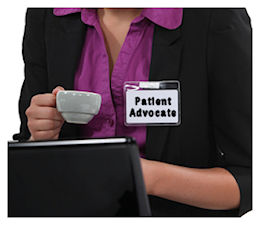Andrea is confused, and if Andrea is confused, others among you are, too. She’s just the one who asked. (You might want to thank her!)
Andrea posted a comment on a previous APHA Blog post called Revisiting the Mean Girls in Our New Advocacy Environment asking me to follow up now that we have certification for Patient Advocates. Her confusion (excerpted, but you can read it all here):
In my opinion, the PACB certification does not nullify or restrict a state license in nursing. It feels like these two knowledge bases go hand in hand. I cannot find any information on your caution to RNs to ‘specifically NOT promote their work as being nurse-related, and not to cross the line’. I see nothing in the linked ethics or competencies that restricts any kind of nursing interventions other than prescribing medications, and actual medical diagnoses.
In other words, I believe she is asking, “Why can’t I be a nurse and a patient advocate, too?”
And the answer is…. (drumroll please….)
Not only can you be both, but you as a licensed RN may find occasions when you need both skill sets. The distinction comes from the circumstance under which you are working, as described here in two parts.
First – Let’s be sure we understand terminology:
A licensed professional is someone who has met the criteria by the state he or she lives in to earn – and pay for – that license. Whether it’s a nursing license or a driver’s license – the individual has met the GOVERNMENT’S criteria, if any, and none other. Sometimes a state insists upon proof that the person can do what they say they can do when they seek a license. A nurse might be required to prove he or she completed nursing school and/or passed an exam. A driver must take a state-supplied driver’s exam and road test. A bar or restaurant might require a liquor license.
But licensing criteria doesn’t always have a professional basis. Further, licensing does not, by itself, speak to competency (although in some cases, the criteria lean on proofs of competence.) I can apply today for a business license and I don’t have to prove I can run a business. Nor does licensing speak to ethical standards.
Licensed professionals usually hold only one license (with the exception of someone who practices his/her profession in more than one state where it’s a second license for the same professional activity.)
A certified individual is someone who has proven competency in whatever subject area that certification applies to. Whether they are medical/clinical, or finance, engineering, education-related, or any sort of highly trained profession, many professions offer one or more certifications. Certification often requires specific education, an understanding of relevant laws, agreement to a code of ethics and standards, passing an exam, and an ongoing commitment to continued education.
Certification criteria always have a professional basis, speaking specifically to competency. It would be a rare case that someone could become certified without proving the associated competency. Further, certification, unlike licensing, almost always requires a solid understanding, and commitment to, a strict code of ethics.
A final important distinction is that a person might hold one license, but may have earned many certifications. Further, they may hold certifications that have nothing to do with their license. A licensed nurse might hold a certification as a drone pilot or a tennis coach – no relation to her nursing license, of course.
So, Andrea – that’s the first part of the explanation. You are comparing the apples of licensing to the oranges of certification. As a licensed RN, you can certainly hold a certification as a Patient Advocate along with many other forms of certification.
Second – let’s compare the uppercase letters Patient Advocate with lowercase letters patient advocate, as follows:
If you are the best kind of nurse, then you are also, and always, a patient advocate. That is, “patient advocate” in lowercase which is an adjective, describing how you focus your work on the patient you are helping. You’re going to bat for them, doing what you can within the confines of your employer’s requirements and your own license.
 Now, contrast that with the uppercase Patient Advocate – which is a noun, and a title. This changes things, because when you act as a Patient Advocate, or a Health Advocate, or Care Manager, you are not licensed. There are no licenses for any of those titles, and therefore the only guidelines for them are the certifications that may be available. The certifications may dictate what you call yourself at any given moment, in any given circumstance.
Now, contrast that with the uppercase Patient Advocate – which is a noun, and a title. This changes things, because when you act as a Patient Advocate, or a Health Advocate, or Care Manager, you are not licensed. There are no licenses for any of those titles, and therefore the only guidelines for them are the certifications that may be available. The certifications may dictate what you call yourself at any given moment, in any given circumstance.
If you are working for and being paid by your hospital as an RN, then your rules must follow your licensing and nursing-related certification rules. Among those rules are your nursing code of ethics.
But if you are working independently, under the title Patient Advocate, being paid directly by a patient (or an agent / loved one of your patient), and you have earned your BCPA certification, then your certification has different rules which say you cannot diagnose, treat, or perform hands-on nursing tasks. No taking temperatures or blood pressure, injecting medicine, dressing wounds, inserting catheters, or any of the dozens of other hands-on duties you, as a nurse, might carry out.
There are a number of reasons for this, including the fact that not all patient advocates (adjective or noun) are clinically trained or licensed. Also included is the fact that some of the very best, most effective, and successful patient advocates (again, adjective or noun) are not clinically trained. So, to develop the title – the noun – Patient Advocate, and develop its certification – those diverse backgrounds had to be taken into account.
Of course, among the most important aspects of the BCPA are the ethical standards which don’t conflict with your nursing ethics, as you pointed out. But they do limit the tasks you can perform – as described above.
Finally – let’s not forget that if a patient advocate / Patient Advocate is insured as a Patient Advocate, then that liability insurance will not cover any sort of legal action where there is any indication that the insured advocate diagnosed, treated, tested, touched, recommended, or made a decision for the client.
The Conclusion
Yes, you may certainly be licensed as a medical professional, and still earn your BCPA, and no, there will not be a conflict – as long as you define your role appropriately under your circumstances:
- If you are a nurse working in the hospital, then you are performing as a nurse, and there is no question about your role or your ethics. You can still be your patient’s advocate.
- If you are a nurse, and want to work independently as a nurse, then call yourself a nurse and perform professional nursing tasks. But don’t promote yourself as a certified Patient Advocate because you’ll be violating the terms of that certification.
- If you are a nurse, and want to work independently as a BCPA, certified Patient Advocate, then use that title, and do not perform professional nursing tasks.
- If you are a nurse and sometimes you want to be a nurse but at other times you want to be a Patient Advocate, then be sure your contract is accurate to whatever role you are performing, and only use the BCPA credential at the times you are serving as a Patient Advocate.
Will there be gray areas? Yes, of course. Just like there are gray areas among medical specialties or professions, or gray areas between a clinical professional who works as a hospital administrator vs one who is performing medical duties.

For the most part, people just want to know you’ll do right by them – care, cost, and ethics. And that you’ll be a collaborative member of their healthcare team, regardless of what you call yourself or which code of ethics you adhere to.
An Invitation
I invite nurses who are working as independent Patient Advocates, in particular those who have earned and promote their BCPA credential to weigh in below. Have I articulated your experience? Has this clarified for you too? Or – maybe you think I’m out in left field!
Your turn!
MASTER LIST OF PRACTICE RESOURCES | LEARN ABOUT APHA MEMBERSHIP | REASONS PATIENTS NEED ADVOCATES






I am a nurse who also has a private practice as a Patient Advocate. I am licensed as an RN, and I have a Masters degree (Nurse Practitioner program). I have yet to take the PCB Exam (I will register for the March 2019 exam). When I became a business (LLC), I was given a professional liability insurance policy that stipulates that, as a Patient Advocate (or Care Manager), I cannot do “hands-on” nursing tasks. I can delegate them to a skilled nurse or family member, but they would not insure me to perform typical nursing duties in a private practice. So a lot of what you call yourself & what your role actually looks like will depend on what liability insurance policy you can purchase, now that you are no longer insured by a hospital.
Absolutely! You have to be careful what you allow yourself to be contracted to do as a patient advocate. I actually have my clients that are local sign a letter of understanding that they understand the scope of my services and that I am not required to provide clinical care. Now, with that in mind my critical care skill with my case management skills work very well together with advocacy services. Many client really need someone who understands the intensive lab and test results and can communicate on the level required to get results. Nothing but experience will help there.
Hi All,
Trisha, I think you nailed it here. I am a BCPA with my own business, and also a registered nurse. When I am working as an advocate, I am doing only those things an advocate can/should do (as outlined by the ethics and competencies)…no blood pressures, no physical assessments, etc. BUT, I am always and will always think like a nurse, there’s no way around that and there’s nothing stopping me from using my knowledge as a nurse and applying it to advocacy. The difference is, I apply it within the scope of my practice as an advocate and not a nurse. 🙂 Personally, I see it as a benefit to have both, but it also doesn’t mean that I will have a more successful business than the advocate who is not a nurse. Also, when I am working as an advocate I don’t necessarily “want” to do nursing things “tasks.” I wanted out of bedside nursing so that I can help people get all that they can from the healthcare system. And if I’m focused on nursing tasks, then am I really doing the patient justice? I can help someone organize a blood pressure log, and teach them the importance of maintaining one (advocacy), but I’m not there to take the blood pressures (nursing). Not to mention, my business policy doesn’t cover me for hands on work. As an advocate, I see my role as somewhat of a project manager, so if I’m focused on the nursing details alone, I might miss the bigger picture and what might benefit the patient or family. I totally understand Andrea’s original post, and the questions she posed, but the PACB does not say you can’t think like a nurse and use your nursing “knowhow” to help patients. For me, when I am doing advocacy, I take off my nursing hat and shoes, but I never shut off my nursing brain… my two cents… Thanks for the great post Trisha!
I think Anne encapsulated my thoughts also. I bring my nursing ” brain”- insights, knowledge, experience,
to every advocacy patient. While I do no hands on nursing, I do plenty of nursing thinking, organizing, communicating, educating. I know when a client needs hands on nursing and how to help the client access those resources I can not provide in my advocate hat.
My business insurance also specifically prohibits me from providing nursing care while functioning as an advocate. I also do not want to potentially jeopardize my nursing license by providing nursing care outside a scope of designated practice.
I feel like as a nurse, I am used to always “switching hats”. Although sometimes I must admit, it is hard to “stay in your lane” when you know that something needs to be done for a client and you are so capable of doing it. But, being clear with clients and setting realistic expectations at the beginning of the relationship has helped.